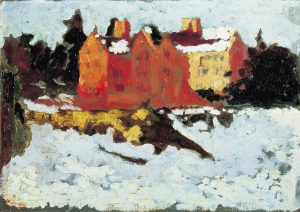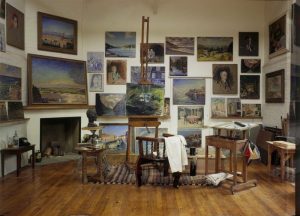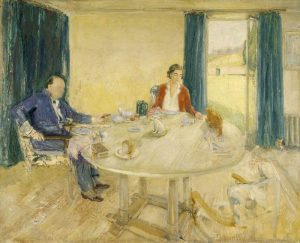
Finest Hour 178
The Diaries of Leo Amery: Chartwell, Europe, Israel, and a Royal Wedding
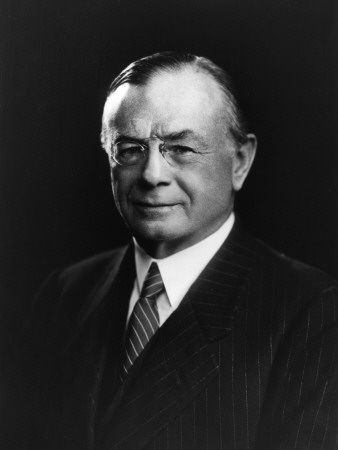
Leo Amery
April 1, 2018
Finest Hour 178, Fall 2018
Page 12
Leo Amery (1873–1955) was a lifelong friend of Winston Churchill, although politically they were often at odds with each other. They first met while at school together at Harrow—a humorous account of which Churchill immortalized in his autobiography My Early Life. Both men worked as war correspondents in South Africa and shared a tent together the night before Churchill’s famous armoured train encounter that led to his capture by the Boers, subsequent escape, and enough resulting notoriety to catapult him into Parliament “ten years before you!” as he later chided Amery, who had preferred to slumber in his cot.
Unlike Churchill, Amery remained a lifelong Tory and zealously championed protective tariffs, while Churchill, a supporter of free trade, left the Conservative party to join the Liberals in 1904. When Churchill returned to the Tory fold to serve as Chancellor of the Exchequer under Prime Minister Stanley Baldwin from 1924 to 1929, he found a strong antagonist in Amery, who served as Colonial Secretary in the same Government.
After 1929 both men found themselves consigned to the backbenches during the appeasement years. Although Amery, like Churchill, was an outspoken critic of Hitler and an advocate of rearmament, the two men differed strongly over home rule for India, which Amery supported and Churchill opposed. Ironically, when Churchill became Prime Minister in 1940 he named Amery as his Secretary of State for India. This led to intense clashes between them in Cabinet.
Amery wrote three volumes of autobiography that covered the years up to the Second World War but died before he could complete a fourth volume describing his time serving under Churchill. He did, however, keep an extensive diary most of his life. The diaries up to 1945 were published in the late twentieth century and are an important primary source. The post–1945 diaries, however, have never been published, but along with the rest of the Amery papers are open to researchers at the Churchill Archives Centre. This then is the first appearance in print of the extracts from the Amery diaries that follow. They have been selected because they provide colorful, firsthand accounts of Churchill after the war.

2025 International Churchill Conference
A Day at Chartwell
This entry is from 1946. Churchill had just delivered his “Let Europe Arise!” speech (see FH 173) in Zurich on 19 September, in which he had called for “a kind of United States of Europe.” Amery and his son Julian were invited to Chartwell to meet with Churchill, along with Churchill’s son-in-law Duncan Sandys and Robert Boothby, to discuss how to build upon Churchill’s European proposal. In what follows, Amery makes reference to the efforts then being made by the Labour Government to grant independence to India, triggering Churchill’s disparaging remarks about Lord Wavell and Sir Claude Auchinleck, the Viceroy and Commander-in-Chief in India respectively.
September 30th
Drove over to Chartwell in order to discuss with Winston following up on his Zurich speech. I found him busy with a hose cleaning out one of his artificial pools and turning on a small toy waterfall. He just loves the place and is full of plans for beautifying it for the benefit of the National Trust and of all the tourists whom he expects to come in future years to see his home. There is something delightfully boyish about his love of doing things to the place. In the house itself the ground floor is to become a sort of museum and he has made a flat upstairs.
Presently we were joined by Duncan Sandys, Boothby and Julian and sat down to a substantial lunch. Winston explained that he was all for simplifying things and against the luxury of complicated drinks and that therefore he had put nothing on the table except Pol Roger 1928 followed by port and old Drambuie, of all of which he partook with gusto.
We had a lot of talk that presently boiled down to this: that he means to bring together in London early next year a handful of continental statesmen who are to start the torch alight in their own several countries. I think he means to handle France, Belgium and Holland himself, but I daresay Duncan or I will have to visit Italy, Germany, Scandinavia etc., to collect our quota. He believes that Europe is right for a movement of that sort to sweep right through and dominate every party. Above all he is keen that whatever Germany has suffered and has still got to suffer there must be the blessed oblivion of which he spoke at Zurich.
Meanwhile an admirer of Winston’s had offered to present him with two wonderful highly trained Hungarian stallions and as he could not accept the gift had arranged to bring them down to perform in front of the house which they duly did, dancing to music and exhibiting all the points of the highly trained Spanish or circus school. They were lovely creatures, snow white and hardly seemed to touch the ground as they performed their different paces. Some of these were exactly like the horses in the Panathenaic procession and it occurred to me that the latter were really trained to do these things and not merely performing spontaneously. While this was going on Mary [Churchill] arrived in riding kit and presently rode one of the horses herself very successfully. Even Winston, who has not been on a horse for 10 years, was induced to mount and ride up and down once or twice.
I might add that Winston kept off the controversial ground of India except for a couple of minutes just as we were going down to his studio, in which he referred to that as Wavell and that traitor Auchinleck, but I refused to be drawn beyond saying that I disagreed and got him off the subject. His sketches are really very attractive and give him infinite pleasure. He says that he is quite unconscious of standing on his feet for hours once he is busy painting. It will be rather amusing if at the close of our lives we find ourselves working in unity after having been at variance almost all the time. But I still do not feel altogether confident that difference won’t arise again, if not over Europe, at any rate in other fields.
Royal Wedding
In 1947 Amery and his wife Brydie, known as “B,” attended the wedding of the heir to the throne to Prince Philip.
November 20th
Princess Elizabeth’s wedding. B and I drove down early and found our places in the Nave [of Westminster Abbey], in a block of Opposition ex-Cabinet Ministers. Winston was apparently the only person in the Choir, and he and Clemmie walked up, his beaming smile almost as broad as his waist line, rather looking as if the whole thing were his own show and he the genial parent or godparent of the Bride. After the ceremony, while waiting for his car, he strolled back down the Nave to chat to Anthony [Eden] and Oliver Stanley, pick them up and give them a lift home. The contrast between him and [Prime Minister] Attlee, trying to look as if he wasn’t there, very striking.
A few days later on the 25th, Amery met with South African Prime Minister Smuts and discussed the wedding.
He told me a nice story about Winston, whom he was sitting next to at the Abbey. Smuts said, “This is the Middle Ages.” “No,” said Winston, “This is all the ages.”
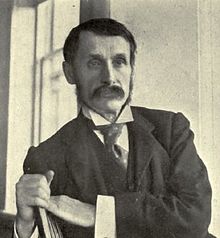
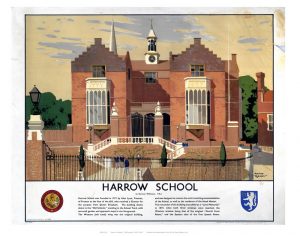
Harrow Visit
Amery was a governor of Harrow and during the war had successfully persuaded the Prime Minister to visit their old school for the first time in decades and listen to the school songs. Churchill had not been fond of his schooldays, but the visit was a success and thereafter became a post-war tradition. This entry from 1948 touches on the subject of newly-established Israel, which both men strongly supported.
November 4th.
Winston’s car came round to fetch me about 4 o’clock and presently he came along from the Smoking Room and we drove down to Harrow for his usual concert. He began being very glum about the present state of the world and about a creature like Cripps [Labour Chancellor of the Exchequer] boasting of having liquidated the British Empire….We got onto Palestine….He thinks [Foreign Secretary Ernest] Bevin’s policy has been hopeless and that Partition should have been done with our troops to keep order, but evidently feels deeply about the murders. On the other hand, with his characteristic love of vigour he could not help saying that he thought the terrorists tremendous fellows in their way. Anyway, he was delighted that the Jews had beaten the Egyptians.
We then got back onto the Harrow songs and the beauty and felicity of their influence, putting Bowen first, but Howson by no means negligible. He added that he was increasingly coming round to the view that it would be a disaster to drop the Classics and Humanities generally. After we were at the concert I felt a sudden pang of remorse at having talked all the time to Winston when he might have been wishing to think out a speech and I was very interested to find that his speech to the boys was really the result of our talk, including even a glimpse of a pretty girl on horseback whom I had pointed out to him in the Park. Topped up by talking about Rule Britannia which was included in the programme at the end. It was, perhaps not one of his most inspiring speeches and his voice has grown rather old. All the same there were things in it that will live in the boys’ memories. Apropos of that I mentioned on the way back the influence that G. R. Parkin’s lecture on the Empire at Harrow had had on me [circa 1890]. Winston then proceeded to quote an actual phrase in it which I confess I had forgotten—a very fine one too—when Parkin said that the day would come when instead of Nelson’s signal being flashed down a line of ships, it would be flashed down a line of nations round the world. For songs we had Stet Fortuna, Queen Elizabeth, Five Hundred Faces (beautifully sung by a small boy from a council school), Boy, Byron Lay, and Giants. Winston only had twenty minutes or so with the Monitors afterwards as I had promised to bring him back to meet a deputation of Finnish Parliamentarians at Hyde Park Gate.
Talking of Army Reform, Winston rather took the line that, hopeless as the present organisation is, nothing could be really set right in time to deal with war if it came in the next couple of years, a rather defeatist conclusion. We talked of much else. He is a good deal more deaf than he used to be and I think more so than myself. At his house I helped, together with Pug Ismay and Clemmie, to entertain a dozen or more Finnish Parliamentarians, male and female, rather square faces, and rather tough individuals, very few of whom spoke English, and I chatted a bit with the Speaker in German. Winston then welcomed them in a happy little speech dwelling chiefly on the value of individual freedom and the rejection of the slave life.
Talking about his school days Winston said rather pathetically that the whole eleven years of his boyhood, both at prep school and at Harrow, were unhappy, and the holidays unhappy too. The only thing he agreed with [Indian Prime Minister] Nehru on when he saw him the other day was that they had both been unhappy at Harrow. “It was all very well for you, a successful athlete and brilliant scholar, but I was no good at work or games. I hated both cricket and football,” he said. It struck me as rather pathetic but I suspect Winston’s aggressive, self-centered temperament had a good deal to do with it. There was none of his present mellowness about the schoolboy or even the younger man.
Israel
As Assistant Secretary to the War Cabinet in November 1917, Amery—whose mother had been Jewish—drafted the document that became known as the Balfour Declaration providing British support to the Zionist cause. As Colonial Secretary in 1922, Churchill had responsibility for implementing this policy. Both men continued to follow the establishment of Israel with keen interest.
February 10th [1949]
Apropos of nothing in particular Winston suddenly indulged in an eloquent outburst on the subject of Israel and what a big event it is in history adding that it really is all to the good that the result has come about by fighting.
Chartwell Again
In the summer of 1949 Amery visited Chartwell again to discuss with Churchill the Middle East and defence matters. They also discussed Amery’s possible return to Parliament, which he had been out of since losing his seat in 1945. The entry concludes with Churchill urging Amery to take something stronger than tea!
August 21
In the afternoon Sadie drove me over to see Winston, whom we found in a flannel romper suit with a sombrero, superintending the cleaning out of his little ponds. He told us there had been a great crisis, and for a moment I thought he referred to the world situation, but I think it was only the blocking up of the drain pipe of the pond by mud, of which there was certainly plenty. I talked to him as best I could about the Middle East and Defence, but as often as not his answer was directed to the German ex-prisoners working for him. However, he told me he had read my Middle Eastern memorandum with great interest, but apparently not yet my Defence Memorandum or my two Middle Eastern articles. Presently I told him that if he thought I would be really useful in Parliament I would be willing to submit myself for the Oxford by election if they wanted me. He said that I certainly would be useful though he had thought of me for the other House [i.e., the Lords]. I put to him the objection that in that case my death might at any moment cut Julian out of the House of Commons and limit his political prospects. It would be very different if I felt sure that the House of Lords would be so reformed that hereditary peers have the option of staying out….We then had tea with Mary, who was delightful as always, and [her husband] Christopher Soames. Winston vainly trying to persuade me to take whisky and soda instead on account of the toughening effect of its carbohydrates.
Amery diary extracts reproduced by kind permission of the Master and Fellows of Churchill College, Cambridge.
Subscribe
WANT MORE?
Get the Churchill Bulletin delivered to your inbox once a month.

